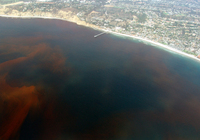The Red Tide

There is an important report about the impact of environmental change in this month’s issue of the journal Chest.
Red tide is a common name for a phenomenon known as an algal bloom,
a well known event in which marine algae accumulate rapidly in the
water column, or “bloom”. These algae, more correctly termed phytoplankton, are microscopic, single-celled, plant-like organisms that can form dense, visible patches near the water’s surface. We know that red tides have been occuring in the Gulf of Mexico for centuries, but they appear to be spreading and to be becoming more common and severe.
The main type of plankton is a species of dinoflagellate known as Karenia brevis, that is concentrated along shorelines and produce highly potent aerosolized toxins. The new research shows that Florida red tide toxins – called brevetoxins can impact respiratory function and increase respiratory symptoms in patients with asthma.
In otherwise healthy people inhaled aerosolized red tide toxins can lead to eye irritation, runny nose, postnasal drip, nonproductive cough, and wheezing. The symptoms usually subside after leaving beach areas. But things can be far more serious for people with asthma, who may experience respiratory problems and decreased lung function after just one hour of beach exposure to the toxins.
This was a fine piece of research funded by the National Institute of Environmental Health Sciences, and makes it clear that not only that asthma sufferers need to be aware of this potential source of trouble but that we all need to be alert to the possibility that human activities are increasing the red tide and with it, the risk of further health problems.







Dear Mr. Petty,
Is there any research to show the impact of pollution, climate change etc. on the health of children. I am particularly interested in how the envioronment impacts the incidence of the following (or
other) children’s mental health issues:
Anxiety Disorder
Depression
Conduct Disorder
Attention Deficit Hyperactivity Disorder(ADHD)
Eating Disorders Schizophrenia
Bi-polar Disorder(Manic-Depression)
Early Childhood Development
Cheers!
Tom Wolfer
Dear Tom,
You have raised a great question that has been discussed many times in ecent years, particularly in light of the data associating urban birth with schizophrenia.
The only children’s mental health issue that does seem to be associated with pollution is autism. (http://richardgpettymd.blogs.com/my_weblog/2006/11/industrial_chem.html)
There may very well be others but my read of the literature is that there is nothing certain.
A related question is the possible association between degradation of the food supply and mental illness. There a brief piece here: http://richardgpettymd.blogs.com/my_weblog/2006/01/nutrition_and_m.html
Kind regards,
RP